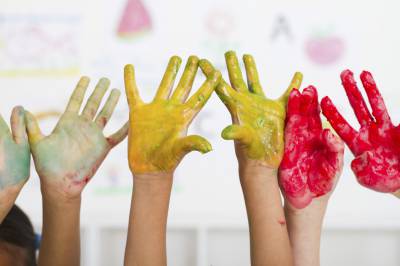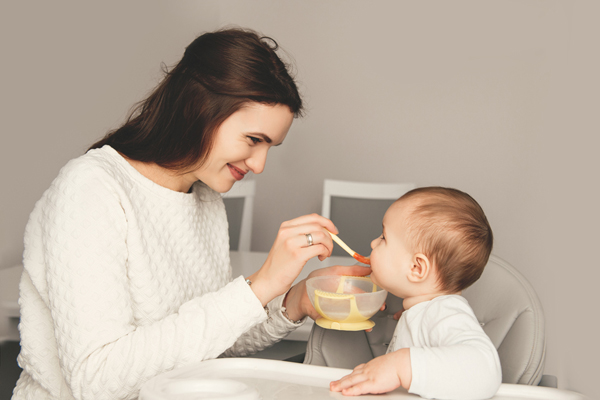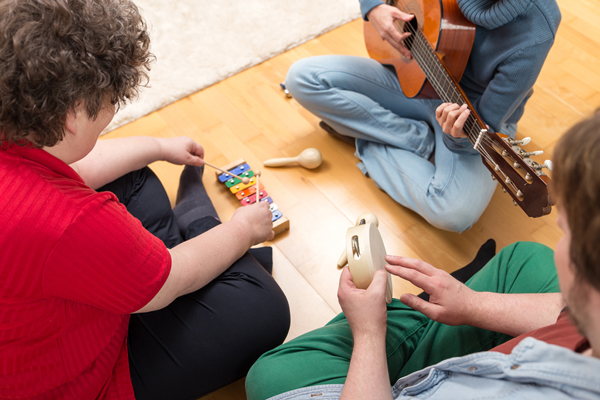Circle Speech - Small Talk

Language Development
- Subscribe to this category
- 17 posts in this category

Preschool is a first school experience for many children. The excitement children and parents feel is mixed with some nervous thoughts and hopes that all goes well. After the initial few weeks of adjustment, most kids are off and running .... and painting, building, coloring and even writing.
There are unique and wonderful differences in the way children learn, however. As the preschool year progresses, some children will feel more confident with a little extra support. Always schedule time to speak with the teacher, of course. There are many other little things you can do, as a parent, that add up to a whole lot of help for your child.
Three Steps To Take If Your Pre-School Child Needs a Language and Learning Boost:
Make Connections: Connect with other families in the class. Plan a short activity outside of school time. Play time around an activity like the park or an art class works well because you can set a definite beginning and ending time. Too long=too much time for melt-downs!
- Talk about transitions: A big part of school adjustment is learning to operate on someone else's time schedule. At home, you can reinforce the concept of a schedule by talking about the day, using a calendar or daily schedule board. If your child finds switching from one thing to the next very challenging, you might find a picture schedule helpful. It can be short--a board with pictures that shows what is "happening now" and what is "next".
- Pump Up the Play: In preschool, symbolic or "pretend" play takes a major leap. Children are combining toys together to make elaborate play themes that build language, social and cognitive skills. Children who need support in language and learning often struggle to join the fun. Help your child by playing with him. Stretch his imagination. Model new words and new ideas about play.
Circle Speech Services is offering Preschool EXTRA-a creative learning class for preschool age children staring in September, 2014 at The Learning Experience in Doylestown PA. This ten-week language and social enrichment class is ideal for children who need a little support to thrive in their current preschool. Registration starts May 1st! Click here for more details. Contact me at susan@circlespeechservices.com or call 215-622-5004 for more information!
If you would like to explore more about language and learning in the preschool years, visit Circle Speech Services at www.circlespeechservices.com or LIKE us on Facebook at facebook.com/CircleSpeech
The ads feel like a little pat on the back (as a Mom). I didn't produce any Olympians, but we muddle through. Those ads have a bigger impact on me, though, because I can see the parents of the special needs kids in my practice in those Proctor and Gamble moms. Just like those Moms weren't expecting to raise Olympic athletes, most parents are not expecting their beloved child to also have special needs.
Parents of children with communication and learning challenges sacrifice time, money and sleep every day to support their child. They are educator, advocate, friend, role models, chef, doctor and, yes, cheerleader for that child. Often the correct decisions are unclear and there are road blocks at every turn. Supporting a child with special needs is expensive and exhausting. Parents of children with special needs are juggling time with the rest of the family, time at work and giving up on sleep to get it all done.
The "Thanks, Mom" ad campaign reminds me why I do what I do in my career and my life. I offer my help to children with special needs, and their families, to celebrate what they accomplish each day. No one is making a commercial from their daily routine, but it definitely takes the stamina of a dedicated athlete to do what these parents do. I notice. And I hope to lend a hand.
If you need help working through a communication challenge with your child, I'd like to help you. www.circlespeechservices.com
It's no different for children and learning. Whether they are learning to talk, walk or drive, your children want to know "What's in it for me?" Watch what your kids do and say. What holds their attention, makes them laugh. What do they do without being told?
Then, find a way to tie that thing to the skill you are teaching. If your child likes movement play, don't try to teach her about animals by doing a puzzle. Go outside and chase sown some squirrels. If your child collects rocks, teach addition by counting his rock collection.
Some kids with special needs don't let you know right away what motivates them. Some might have a small number of activities they enjoy. But, I have never met a child who wasn't motivated by something. Whatever that is, it is essential that you find it, if you want to help your child learn something new.
What motivates your children to learn something new?
Here are my Top 5, in no particular order:
1) pom pom craft balls: count, pour throw, catch, glue them. One big plus is they do not fit up a child-sized nose.
2) wrapping paper tubes: use as microphone, instruments, racetrack, marble run. Wrapping paper rolls don't always come with the cardboard tube anymore. If you get one, hoard it!
3)coffee cans: use as a bank, cash register, magnet board, drum, container to fill and dump the pom pom balls you just bought.
4) balloons: are the best toy ever made. Catch, throw, hit blowup, pop, draw on, stick to the wall. So fun. And that is just scratching the surface.
5)water: in sinks or small tubs (or bath tubs). All supervised, of course. SPLASH! Water on/off, fill pour, empty, scoop, squeeze sponges, SPLASH!, color the water, make bubbles, SPLASH!
Use the letters and numbers as a "hook". Start playing with the alphabet letters or magnetic numbers. Let them lead your child into more interactive play. You can hold a coffee can and let her stick the letters to the outside to "build a house". Use your imagination. The goal is to broaden play beyond naming letters and numbers.
Expand on pictures in letter and number books. If your child is distracted by the letters or page numbers in books, help him find fun by looking at the pictures. Describe what's happening, use action and describing words. "Tell the story" using only the pictures. If you are looking at counting books, name the items rather than counting them.
Play with the sounds of those letters. Letter sounds can be more important than letter names in early language and pre-reading skills. Try associating the sounds the letter "say" rather than the name. (The A says /ah/). Challenge your child to find 5 things in her playroom that start with that sound.
These are just three ways you can use a love of letters and numbers to unlock a world of language-rich play for your child. What games do you play with your children around the ABC's and 123's?







